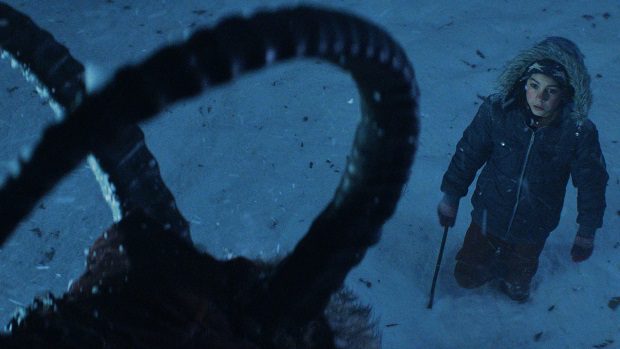Jingle All the Way to Hell

With 2007’s “Trick ‘r Treat,” horror fans hailed director Michael Dougherty for reviving both the horror anthology and the Halloween flick. Now he hopes to do the same for Christmas horror with “Krampus.” I liked but didn’t love “Trick ‘r Treat” and I wish I didn’t have to say the same thing about this new movie, since its ideas are fresh–but the execution, so to speak, leaves a few things to be desired.
The story of “Krampus” is beautifully simple. A band of disliked relatives descends on a wealthy family, exposing the wealthy parents’ own flaws and failures. Their son Max (the excellent Emjay Anthony), who has kept the Christmas flame a-burning in his heart and even written a letter to Santa Claus, finally gives up on joy and peace after some torment from his awful cousins. He rips up the letter and flings the pieces out the window–and by doing this, he summons Krampus.
“The shadow of St. Nicholas,” Krampus wanders the earth punishing those who give up hope. Max’s grandmother (Krista Stadler, reminiscent of the great Mai Zetterling in “The Witches”) offers the not-quite-comforting advice that Krampus can only be conquered by the true Christmas spirit–of sacrifice. Max and his family band together, overcoming their differences to battle Krampus and his minions, but their best efforts aren’t enough, and Max must make the final, dreadful choice alone.
This is just a great premise. Krampus himself is terrific, all hoofprints and shadow horns. The twist that our individual cruelties and failures don’t matter as long as we don’t give up hope is an intriguing antidote to the checklist moralism of so many Santa tales. There are plenty of sly references, like stocking stuffers: the scary snowmen of “Calvin & Hobbes,” some household injuries from “Home Alone.” The movie’s first and last fifteen minutes (counting the credits—you should stay through the end) are nearly perfect, starting with a Black Friday rampage scored to “It’s the Most Wonderful Time of the Year” and ending with a “Krampus Karol of the Bells.”
And the class antagonism gives the film an unexpected sociological dimension. The families’ sins are clearly class-coded: the rich dad uses work as an excuse to flee his family, the rich mom is a high-strung and judgmental perfectionist who looks down on her poorer sister; the sister had a shotgun marriage and now has four children (this is treated like she practically had a litter—four!), her kids are undisciplined and violent, and her husband is a gun nut who says things like, “So much for global warming.” Even the families’ virtues are class-linked: The poorer sister is the only one who can be bothered to care for a less-pleasant member of the extended family. These aren’t the class cliches of “Gremlins,” where rich people are simply bad whereas everybody else is salt of the earth. The rich parents must renounce judgment and take up guns—but this is a movie that identifies with the rich, even while criticizing them. The movie takes place on their turf, from their point of view. It’s especially noticeable that the (middle-class!) poorer kids are awful whereas the rich son and daughter are just about flawless.
This creepy identification with the wealthiest happens in part because these characters aren’t fleshed out. Dougherty doesn’t seem to know how to handle so many people: the rich daughter disappears early on, the aunt just sort of drops out of the story, the two tomboys are interchangeable, etc. There’s nothing like the breathtaking “why I hate Christmas” speech from “Gremlins,” but fine, not everybody can be Joe Dante. We should at least get some nuance and depth to the children’s characters. Everybody in this film has a maximum of two dimensions. Their actions are often poignant—I choked up when the rich father (Adam Scott; all four of the parents’ actors do a lot with a little) hugs his son, and as he reassures the boy we see him close his eyes in fear as he starts to acknowledge that maybe things won’t turn out okay. But it’s hard to make an iconic film with such bare characters. (The script also relies heavily on foul language for humor. Censorship is the mother of creativity, people.)
“Krampus” is a fun romp. We can always use more of these stories where the jingling comes from chains, not sleigh bells. Christmas is often a hard time and there’s camaraderie in this movie, as well as an insistence that mere good deeds won’t replace personal sacrifice. I enjoyed this movie but it is sort of like the slightly burnt, slightly hardened gingerbread men you munch on happily because they remind you of other, better Christmas treats.
Eve Tushnet is a TAC contributing editor, blogs at Patheos.com, and is the author of Gay and Catholic: Accepting My Sexuality, Finding Community, Living My Faith, as well as the author of the newly released novel Amends, a satire set during the filming of a reality show about alcohol rehab.
Comments